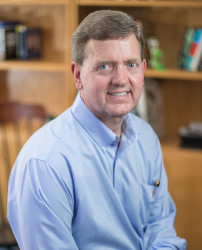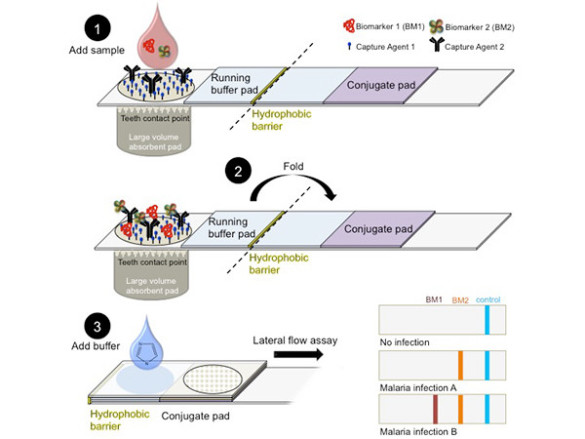
An interdisciplinary team of scientists and engineers at Vanderbilt University headed by Stevenson Professor of Chemistry David Wright has designed a new kind of rapid diagnostic test for malaria that has received a $100,000 Grand Challenges Explorations grant which is designed to support innovative global health and development research projects. It is one of 56 such grants announced today by the Bill & Melinda Gates Foundation.
The innovative aspect of the “Origami Diagnostics to Accelerate Malaria Elimination” project is its use of “paper microfluidics” to produce a malaria test that is one hundred times more sensitive than commercially available tests while retaining the low cost and simplicity required for real world application.
“In order to eradicate malaria, we must be capable of detecting the individuals that carry the malaria parasite but don’t show any symptoms,” said Wright. “Current commercial malaria tests are not capable of doing this. That is why we have engineered our origami test with the sensitivity required to identify these individuals. At the same time, we have designed it so it will be extremely inexpensive to make and so it will be as easy to operate as current lateral flow detectors like the pregnancy test.”
One of the factors that limit the sensitivity of current rapid malaria tests is the small amount of blood that they can process: a single drop. To address this problem, the origami detector consists of a relatively large well that is capped with a porous membrane. The membrane has a special coating that selectively catches proteins produced by the malaria parasite, called biomarkers. Users dilute a few milliliters of blood in a special liquid and pour it through the membrane, which snags the biomarkers as the mixture percolates through. This allows it to collect a much larger number of biomarkers than commercial tests. Once that is done, the users detach the well and throw it away. Then they fold the membrane onto an attached sheet of paper printed with special inks. These inks contain sensor molecules that change color when they bind with parasite biomarkers. Next they wet down the membrane/paper sandwich with a special liquid that releases the biomarkers from the membrane so they will come in contact with the sensor molecules, causing them to change color.

To receive funding, Wright and other Grand Challenges Explorations winners described a “bold idea” in a two-page online application in one of six critical global heath and development topic areas.
This is the sixth Grand Challenges Explorations grant that Vanderbilt researchers have garnered since the program was started. In 2009, Wright, working with Professor of Biomedical Engineering Frederick Haselton, received a grant for developing “Coffee Ring Stain” diagnostics for malaria and Guirong Wang, a senior research associate in the laboratory of Cornelius Vanderbilt Professor in Biological Sciences Laurence Zwiebel, received a grant to disrupt the heat receptors of malaria mosquitoes. In 2012, Research Assistant Professor of Biomedical Engineering Chetan Patil received a grant to develop a mobile phone-based detection system for neonatal jaundice and Associate Professor of Pediatric Surgery John Pietsch received a grant to develop a smart phone-based device for early detection of infant malnutrition. In 2015, Zwiebel received a grant for designing and developing a wristband mosquito repellent device.
About Grand Challenges Explorations
Grand Challenges Explorations is a $100 million initiative funded by the Bill & Melinda Gates Foundation. Founded in 2008, over 1,228 projects in more than 65 countries have received Grand Challenges Explorations grants. The grant program is open to anyone from any discipline and from any organization. The initiative uses an agile, accelerated grant-making process with short two-page online applications and no preliminary data required. Initial grants of $100,000 are awarded two times a year. Successful projects have the opportunity to receive a follow-on grant of up to $1 million. The foundation will be accepting applications for the next GCE round in February 2017.